I’ve previously highlighted the beauty of the Japanese language in a few “How To Japan” articles. Yet, you can feel its richness everywhere in Japan. Though I hear less and less nowadays, there are traditional Japanese names for the months. I love the sound of each name. I believe many countries have their own name for each of the 12 months. Today, I’d like to talk about the resonance and origins of those words, and I hope it also touches upon the beauty of the Japanese language.

First of all, I’d like to look into English names of the month. It seems that English names of months have two fewer months than the actual 12 months. Originally, during the ancient Roman era when the current calendar system originated, a year was not 12 months but rather considered as 10 months. Consequently, what is now March was considered the first month. Later, the year was extended to 12 months, with January and February added, resulting in a discrepancy of two months. Let’s see more.
◎English name of months
January
It is derived from “Janus,” the Roman god of doorways and doors. He is also known as the god of the beginning and end of the year and the month of January.
February
It originates from Roman mythology, from the god of purification and the moon, “Februus.”
March
This name comes from the god of war, “Mars.” Originally, in ancient Roman times, the current month of March was the first month of the year, marking the beginning of the year, so wars were more likely to occur in various places this month, hence it comes from being a month symbolizing war.
April
There is a theory that it comes from the goddess of love and beauty, “Aphrodite.”
May
The month dedicated to the goddess of fertility, Maia, Maius, is the origin. The festival celebrated in the West on May 1st, May Day, is held to celebrate the renewal of nature and abundance.
June
The name is taken from Juno, the wife of Jupiter who corresponds to Zeus in Greek mythology. As Juno is the guardian goddess of married life, brides who have weddings in June have come to be called June brides.
July
It originates from Julius Caesar, who established the ancient Roman calendar (the Julian calendar) and named the month of his birth after himself.
August
The first Roman emperor, Augustus named his month of birth after himself.
September
It means “the seventh month.” The Latin word “Septem” carries the meaning of “7”, as March was the first month of the year in ancient Roman times as mentioned above.
October
The Latin word “Octo” means “8.”
November
The Latin word “Novem” means “9”
December
The Latin word “Decem” means “10.”
◎Wafugetsumei 和風月名
Now that you know the origins of Western names, let’s get into our main topic – the Japanese names of the months. Do you see any similarities or relations to the Western ones?
The character 月 literally represents the month, or the moon in both Chinese and Japanese.
Mutsuki (睦月 むつき) January
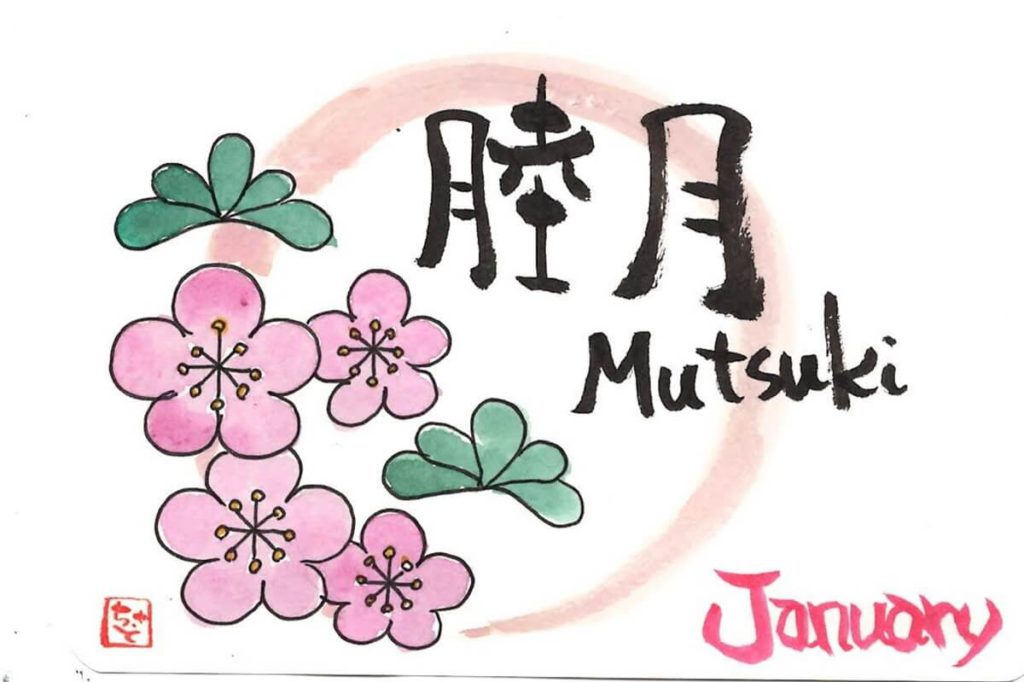
Mutsuki is said to originate from the New Year when families and relatives gather to celebrate it and befriend each other. The character for “睦: mutsu” means “to be close and cordial.”
Kisaragi (如月 きさらぎ) February

Kisaragi also has other kanji, “kisaragi 衣更着 きさらぎ.” “衣” (ki, or koromo) means wearing, “更” is moreover, and “着” means wearing. From this, we know that February is still cold, so it’s the month to put on layers of clothes. But this kisaragi is the Japanese version and we usually use the Chinese version of kanji “kisaragi” nowadays.
Yayoi (弥生 やよい) March

“Yayoi” is said to originate from the phrase “kikusaiya oishigeru (木草弥生い茂る)” which means “plants grow thickly.” The third month of the lunar calendar marks the last month of spring. Yayoi represents the lush growth of plants and trees in the warm weather.
Uzuki (卯月 うづき) April
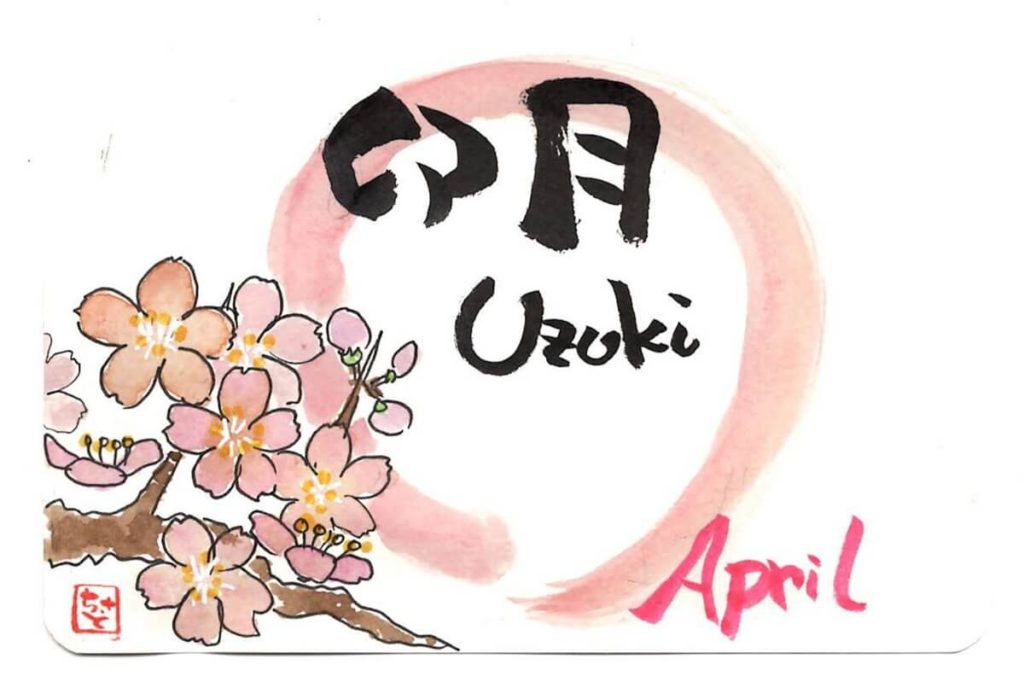
Uzuki is said to derive from the season when U-no-hana 卯の花: deutriza blooms. Though in the current calendar, it blooms with elegant white flowers around May.
Satsuki (皐月 さつき) May
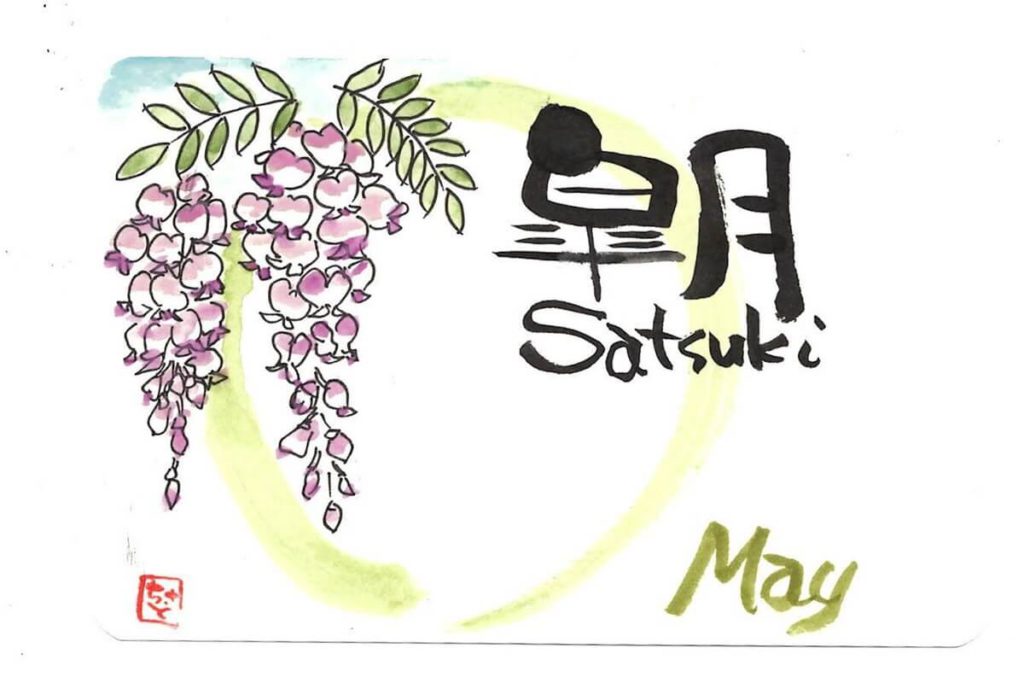
Satsuki is said to originate from the meaning of the word Sanae-zuki (早苗月 さなえづき), the month for planting rice seedlings. Sanae (早苗 さなえ) means rice seedlings transplanted from seedbeds: Nawa-shiro (苗代 なわしろ) to rice paddies. It is said that Sanae-zuki (“planting rice seedling month”) was abbreviated to “Satsuki.”
And the kanji “皐” (sa, or kou) represents a place that is always submerged shallowly in water, like rice paddies, so this current kanji is used.
Minazuki (水無月 みなづき) June
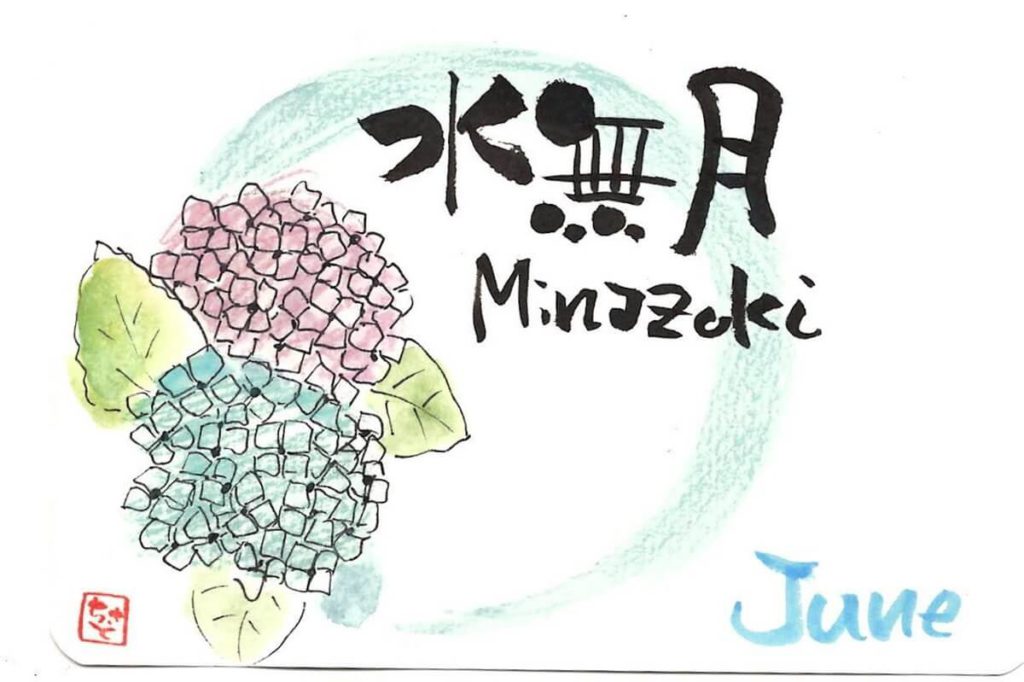
Minazuki is said to originate from the phrase “mizu no tsuki,, meaning “month of water” drawing water into rice paddies. “無” is a kanji that conveys the meaning of “not” or “non-existent.” However, in this context, it’s used in the sense of “of.” Therefore, “水無月” is interpreted to mean “the month of water.”
Fumizuki (文月 ふみづき) July
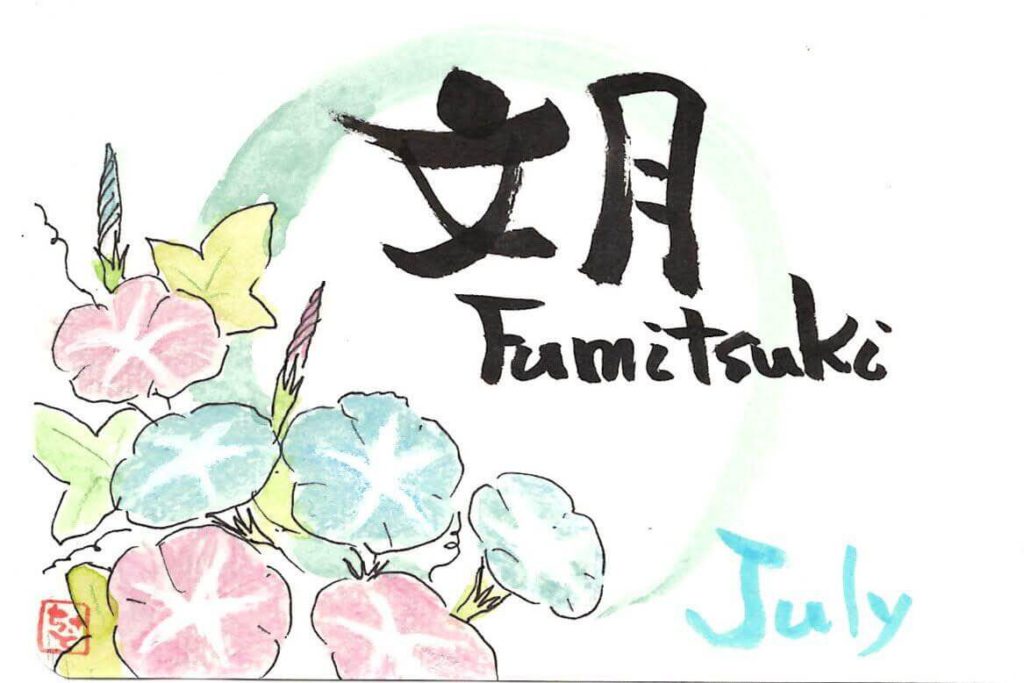
There are various theories about the origin, but one of them suggests that the term Fumizuki (文月 ふみづき) is derived from Hofumizuki (穂含月 ほふみづき), meaning “the month when rice ears begin to fill,” which later transformed into Fumizuki.
Furthermore, another theory suggests that the term originated from “文披月ふみひろげつき (Fumihirogezuki),” which refers to the month when books (文) were opened (披く) during the tradition of airing out books on Tanabata (七夕たなばた), eventually evolving into Fumizuki.
Hazuki (葉月 はづき) August
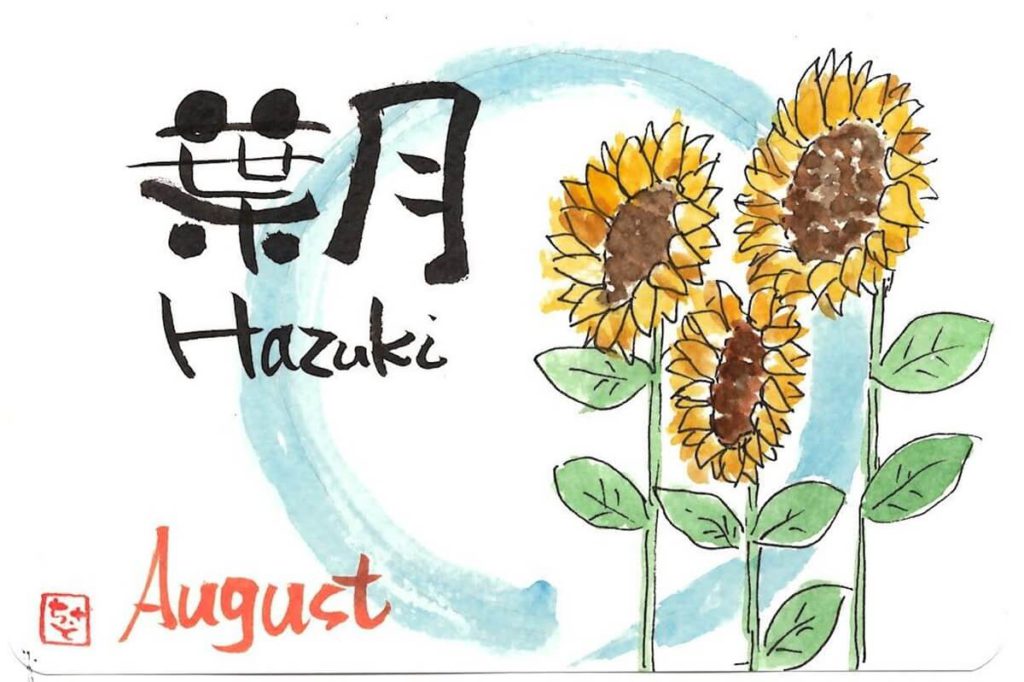
Hazuki is the month when tree leaves fall. In the modern sense of seasons, while August typically evokes the image of the peak of summer, around August 7th, we also observe the beginning of autumn with the “立秋 りっしゅう (Risshū) marking. So in terms of the calendar, it’s when autumn arrives. Generally, it’s said to be abbreviated from “葉落ち月 はおちづき(Haochizuki),” meaning the month when leaves turn red and fall progresses.
Nagatsuki (長月 ながつき) September
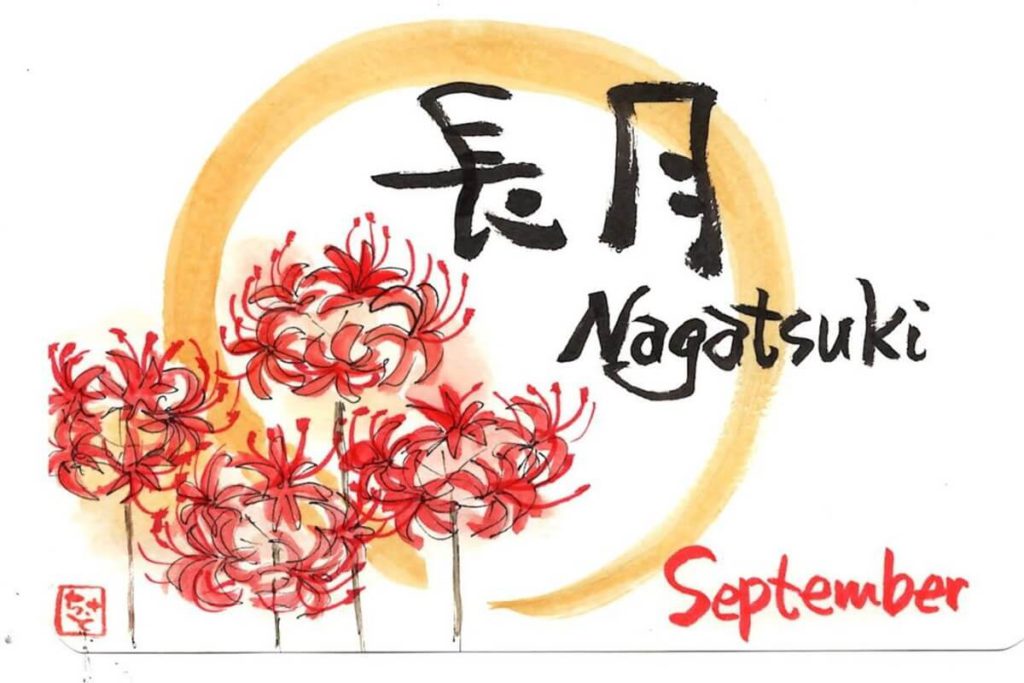
“長” literally means “long.” Nagatsuki refers to the month when autumn is deeper and nights are longer.
Kannazuki (神無月 かんなづき) October

In the term “Kannazuki,” the character “無” usually means “non-existent” or “without,” as mentioned above. However, in this context, it follows the particle “の,” so “Kannazuki” translates to “the month of gods.” In Japan, there are numerous gods known as “yaoyorozu no kami (八百万の神 やおよろずのかみ,)” and during this month, all these gods supposedly gather at Izumo Taisha Shrine in Shimane Prefecture. As a result, gods from various regions are believed to be absent, hence the name “Kannazuki” or “the month without gods.” Conversely, in the Izumo region, where gods from across the country supposedly gather, it’s called “Kamiarizuki (神在月かみありづき)” or “the month with gods.”
Shimotsuki (霜月 しもつき) November

Shimotsuki is said to originate from the word Shimofuritsuki (霜降月 しもふりづき) meaninig “the month of forest falls.”
Shiwasu(師走 しわす) December
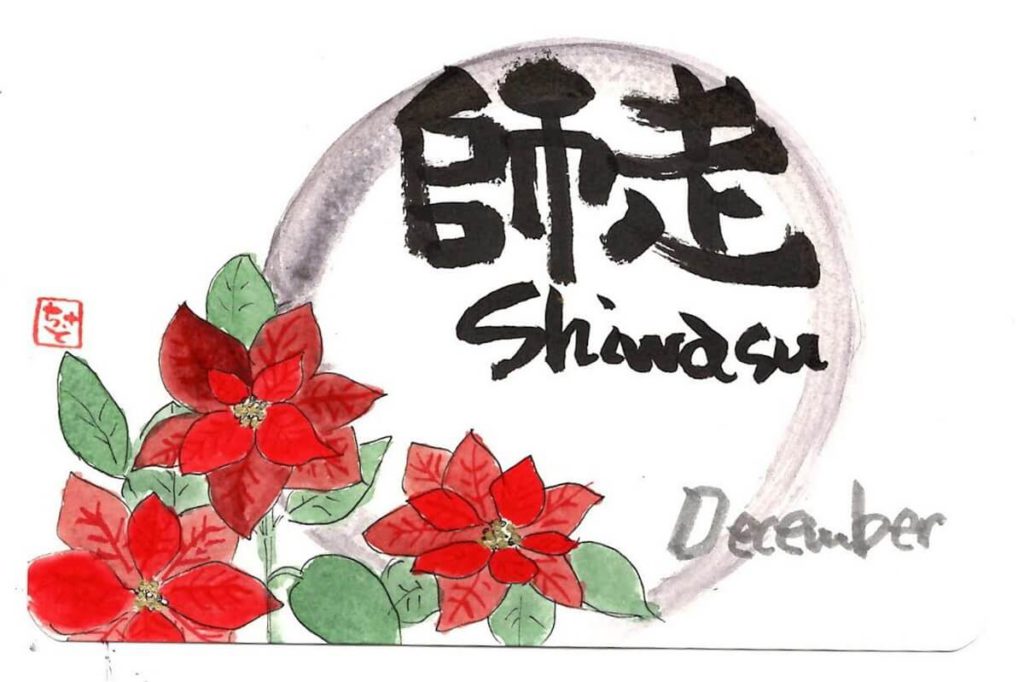
師 literally means a master, and 走 means to run. There are various theories regarding the origin of “Shiwasu” (師走). Among them, one of the most famous is that it originated from “師僧がお経をあげるために忙しく走り回る Shisō ga o-kyō o ageru tame ni isogashiku hashirimawaru,” meaning “the monks are busy hurrying around to chant sutras.” This phrase evolved into “Shiwasu.”
Japanese and Western Representation
Did you enjoy reading my article? Was it interesting to you?
Comparing this, it seems that in English, they show respect for emperors and gods. And Japanese often depict the origin of the moon as representing the state of nature itself. Japanese people were agrarian, so weather was crucial to their livelihoods, which I think is why nature is strongly reflected. It made me want to further pursue the beauty of the Japanese language, as it shows a unique sensitivity to express the depth of nature and the seasons with exquisite words.
Thank you.
I’m a clay artist, and a master of Japanese calligraphy “Onore-sho”. I have my own shop in Ikaruga town, Nara, which is near Horyuji temple: world heritage site. And I’m a volunteer English tour guide. I enjoy learning English everyday.

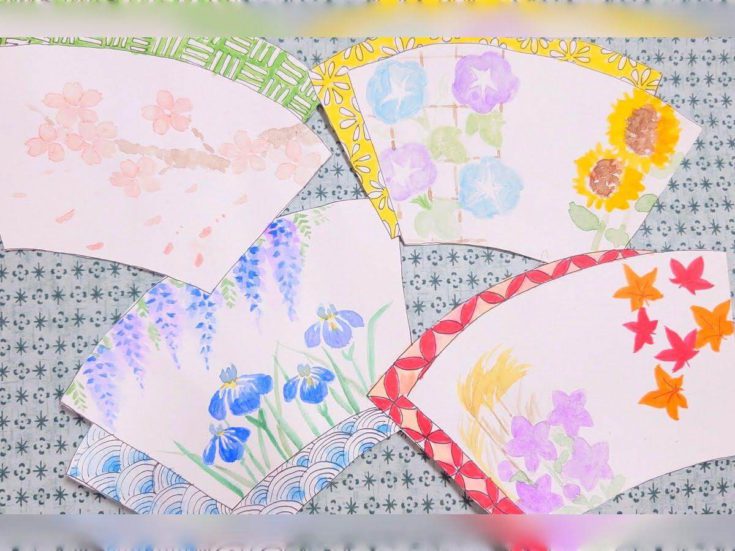


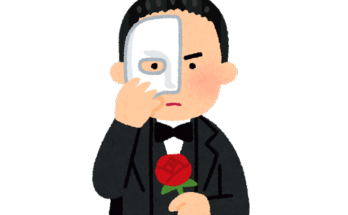
 HTJ has a YouTube page! Check it out
HTJ has a YouTube page! Check it out
BEAUTIFUL article! I love learning about words, and this was just excellent. Thank you so much for sharing this incredible knowledge with me!
Thank you for reading my article. Your heartwarming comment made my day! I cherish our country’s traditions, seasonal events, places, and words… I love them from the bottom of my heart. It’s a little bit difficult to express all this in English, but I will continue writing it as much as I can. Thank you Nathan.